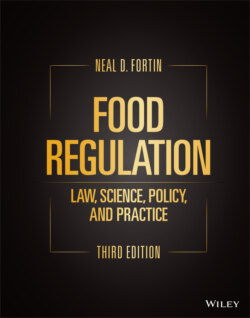Читать книгу Food Regulation - Neal D. Fortin - Страница 280
5.6.2 Compelling Commercial Speech
ОглавлениеCentral Hudson is the foundational case on restriction of commercial speech. However, when speech is compelled, such as required labeling disclosures or warnings, the foundational case is Zauderer v. Office of Disciplinary Counsel of the Ohio.32
In the noncommercial context, the Supreme Court has held that, “the right of freedom of thought protected by the First Amendment … includes both the right to speak freely and the right to refrain from speaking at all.”33 For commercial context, however, in Zauderer, the court clarified that the First Amendment provides minimal protection against compelled speech. The court reasoned that the interests at stake in commercial speech are not of the same order as with compelled political and ideological speech, such as prescribing “what shall be orthodox in politics, nationalism, religion, or other matters of opinion or force citizens to confess by word or act their faith therein.”34
Because the extension of First Amendment protection to commercial speech is justified principally by the value to consumers of the information such speech provides, appellant's constitutionally protected interest in not providing any particular factual information in his advertising is minimal… . [B]ecause disclosure requirements trench much more narrowly on an advertiser's interests than do flat prohibitions on speech, “warning[s] or disclaimer[s] might be appropriately required … in order to dissipate the possibility of consumer confusion or deception.”35
The relaxed Zauderer standard for compelled commercial speech is generally viewed as a rational basis standard of review. If the speech is “factual and uncontroversial,” then the relaxed standard of review applies. Under the rational basis review, government actions “may be based on rational speculation unsupported by evidence or empirical data,” and to challenge the requirement one must “negate every conceivable basis that might support it.”36
An example of application of the Zauderer standard of review appears when the court upheld New York City’s calorie labeling requirement. The court found that the “calorie disclosure rules were reasonably related to the goal of reducing obesity.”37 The court did not review the scientific literature on the effectiveness of calorie labeling but rather found it sufficient that obesity is significant public health concern, driven in large part by out‐of‐home consumption and that providing calorie information in restaurants might help to better inform consumer decision‐making. That is, the court's review and conclusion reflect the nature of a rational basis review. The government actions were supported by rational speculation, which did not require support from scientific data.
